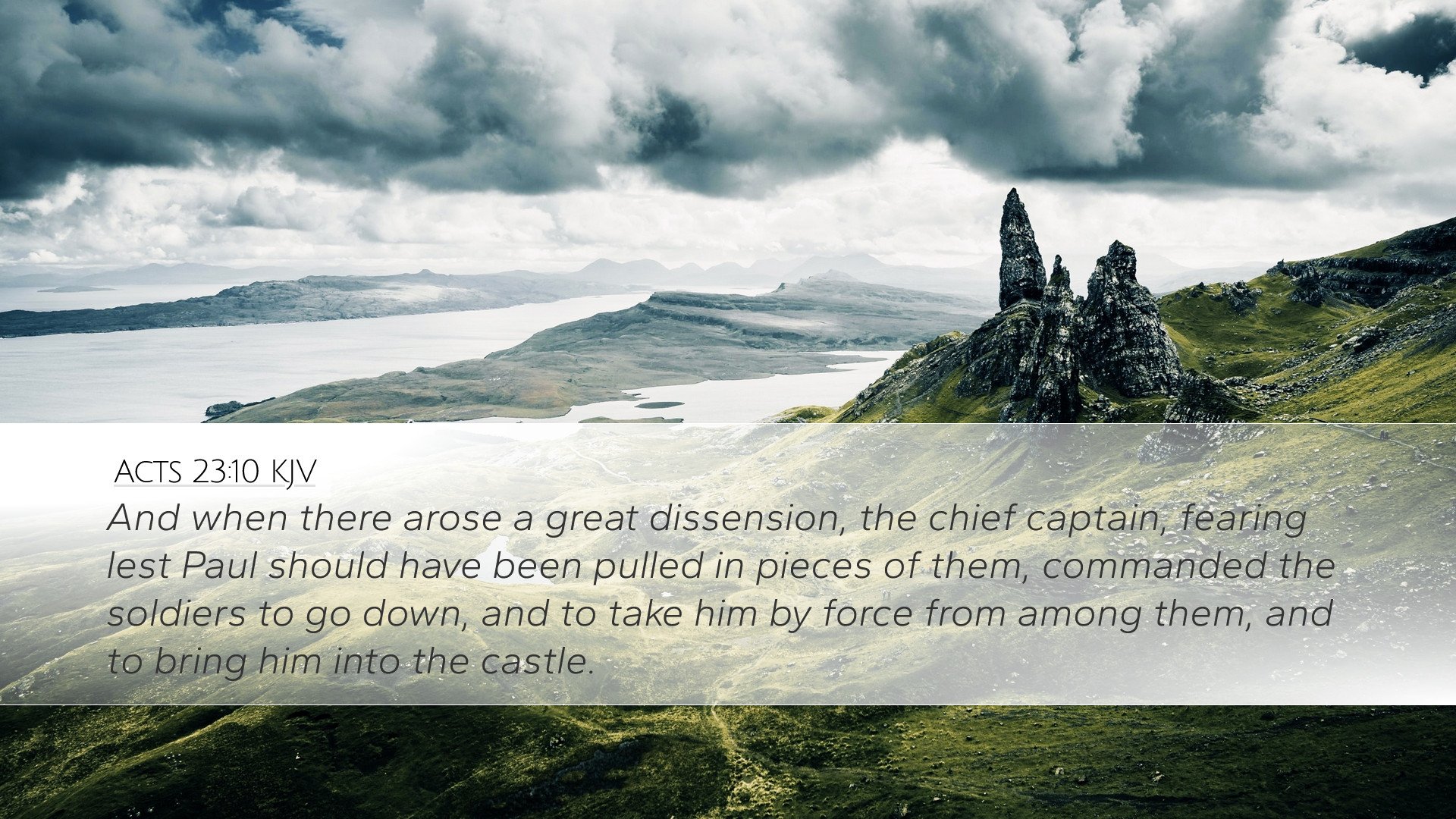Commentary on Acts 23:10
Verse: "And when there arose a great dissension, the chief captain, fearing lest Paul should be pulled in pieces of them, commanded the soldiers to go down, and to take him by force from among them, and to bring him into the castle."
Acts 23:10 depicts a dramatic moment in the life of the Apostle Paul as he stands before the Jewish Sanhedrin, provoking a fierce division among its members. This commentary aims to explore the implications of this verse through the insights of esteemed biblical scholars such as Matthew Henry, Albert Barnes, and Adam Clarke.
Contextual Background
This verse is situated in a pivotal moment following Paul's arrest. Understanding the historical and theological context is crucial. Paul had returned to Jerusalem under the auspices of the church and the guidance of the Holy Spirit, but he faced vehement opposition from the Jewish leaders.
Analysis of Key Themes
The Great Dissension
The term "great dissension" refers to the intense conflict that erupted among the members of the Sanhedrin. Matthew Henry notes that Paul skillfully adepted his defense by identifying himself as a Pharisee and referring to the hope of the resurrection (Acts 23:6). His declaration stirred differing views between the Sadducees, who denied the resurrection, and the Pharisees, who embraced it. This strategic division demonstrated Paul's acute understanding of the sociopolitical landscape of the Jewish council.
The Chief Captain's Intervention
The chief captain's intervention reveals his role in maintaining order. Albert Barnes elucidates that the Roman authority was concerned not just with the safety of Paul but with the potential for public disorder in a volatile environment. The captain's command to "take him by force" indicates the seriousness of the situation and the potential consequences of unchecked factionalism.
Theological Implications
This verse presents several theological implications for understanding God’s providential oversight in the affairs of His servants. Adam Clarke comments on divine protection afforded to Paul, affirming that God had destined him for a significant role in proclaiming the Gospel to the Gentiles. This event not only showcased the dangers Paul encountered but also emphasized the sovereignty of God in navigating through perilous situations.
Comparative Insights
Paul's Strategy vs. Human Opposition
Paul’s clever use of the theological difference among the Sanhedrin reveals a divine strategy for his defense. The dissension serves to demonstrate the inherent conflict between divine truth and human traditions. Matthew Henry asserts that Paul’s mission was undergirded by a higher calling, reflecting the inevitability of persecution faced by believers who stand firm in their convictions.
Protection and Leadership
The role of the chief captain embodies the theme of earthly authority being utilized to achieve divine purposes. The Roman officer acted out of fear for Paul’s immediate safety, yet this intervention was orchestrated within God’s plan. According to Albert Barnes, this moment demonstrates a significant interaction between secular authority and the advancement of the Gospel, suggesting that God can use various means to fulfill His will.
Lessons for Today
For contemporary pastors, students, theologians, and scholars, Acts 23:10 offers profound insights:
- Strategic Defense of Faith: One can learn from Paul's example of addressing challenging audiences with acumen and insight.
- Understanding Conflict: The dissension provides an important example of how theological differences can lead to public conflict, which remains relevant in today's polarized religious climate.
- Divine Protection: The assurance of God's protection in our endeavors should embolden believers to pursue their callings despite opposition.
- Role of Authority: The relationship between believers and civil authorities should be navigated with wisdom, recognizing that God's providential hand can work through any institution.
Conclusion
Acts 23:10 serves as a critical moment within the narrative of Paul's ministry, encapsulating the tension between faith and opposition, divine purpose and human authority. Through the wisdom of past commentators, we glean not only historical insights but also practical applications for navigating faith today. As we reflect on this verse, may we be encouraged to embody the truth of the Gospel with both courage and discernment, fortified by the knowledge that God is ever-present in our trials.


